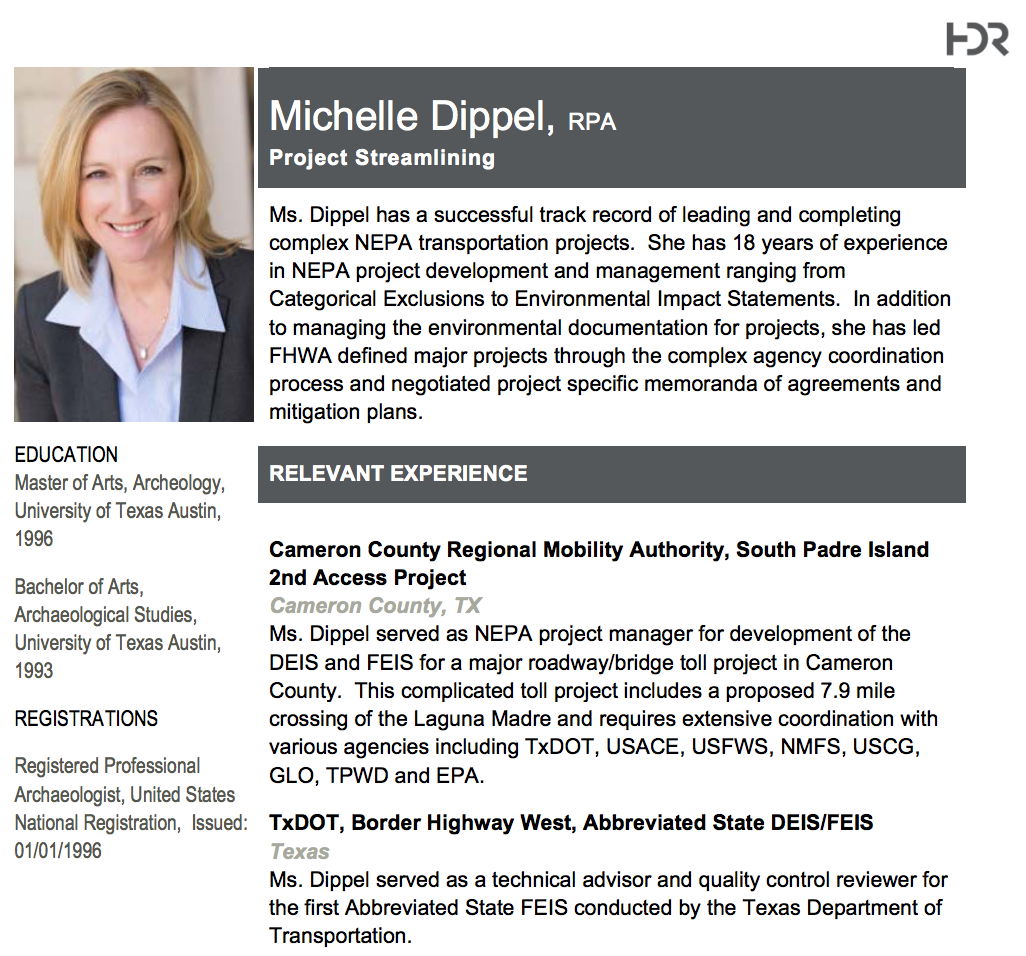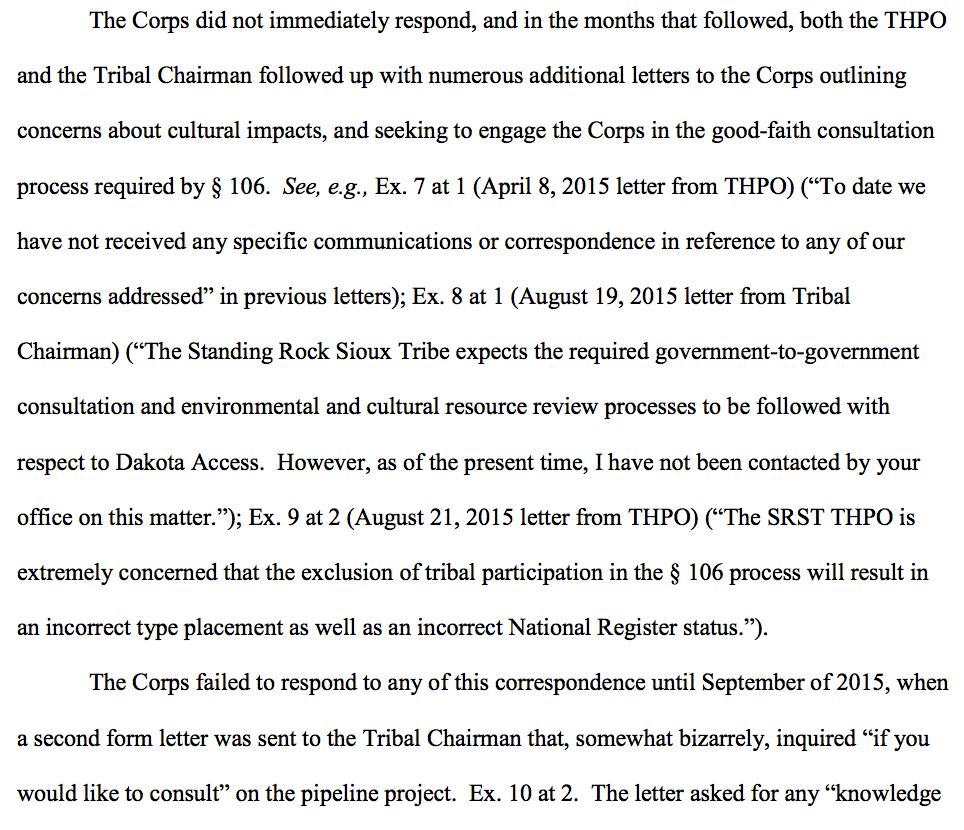The Standing Rock tribe has filed a lawsuit against the U.S Army Corps of Engineers for using the controversial Nationwide Permit 12 to fast-track authorization of the hotly contested Dakota Access pipeline.
Slated to carry oil obtained via hydraulic fracturing (“fracking”) from North Dakota’s Bakken Shale basin to Patoka, Illinois, the plaintiffs say not only was the Army Corps’ permitting of the Energy Transfer Partners and Enbridge Corporation jointly owned pipeline a violation of the National Environmental Policy Act (NEPA) and the Clean Water Act, but also a violation of the National Historic Preservation Act’s (NHPA) Section 106.
A review of court documents for the case currently unfolding in the U.S. District Court in Washington, D.C. has revealed that the tribal liaison for Energy Transfer Partners tasked with abiding by Section 106 passed through the revolving door and formerly worked for the Army Corps. The finding also raises key ethical questions in the field of archaeology.
That liaison — Michelle Dippel — technically works for a Dakota Access LLC contractor named HDR, a company which helps pipeline companies and other oil and gas industry infrastructure companies secure permits for their projects. Dippel, the South Central Region Environmental Services Lead for HDR, began her career as a project manager for the Army Corps’ Fort Worth District and also formerly worked for the natural gas pipeline company Spectra Energy.
An archaeologist by academic training and a member of the Register of Professional Archaeologists, a biographical sketch for Dippel tracked down on the Florida Department of Transportation’s website lists her job sub-title as “Project Streamlining” on behalf of the DOT.
Image Credit: Florida Department of Transportation
Section 106
Dippel lists Section 106 consultation as an area of expertise on her LinkedIn page.
Section 106, in turn, serves as a major part of the focus of the lawsuit, the recently completed occupation of a Dakota Access Pipeline construction site in Cannon Ball, North Dakota, and the push by the Standing Rock Indian Reservation for a court-ordered injunction to halt pipeline instruction.
“Although federal law requires the Corps of Engineers to consult with the tribe about its sovereign interests, permits for the project were approved and construction began without meaningful consultation,” reads an August 24 op-ed in The New York Times by Standing Rock chairman David Archambault II.
“The Environmental Protection Agency, the Department of the Interior and the National Advisory Council on Historic Preservation supported more protection of the tribe’s cultural heritage, but the Corps of Engineers and Energy Transfer Partners turned a blind eye to our rights. The first draft of the company’s assessment of the planned route through our treaty and ancestral lands did not even mention our tribe.”
Indeed, the court documents demonstrate that Standing Rock officers’ letters to the Army Corps often went unanswered.
Image Credit: U.S. District Court for the District of Columbia
An intervenor in the case, the Cheyenne River Sioux Tribe, also testified in court documents about the sanctity of the land as it relates to tribal traditions and history. One of those testimonies came from Cheyenne River Sioux Tribe member Joye Braun, an organizer for the Indigenous Environmental Network.
The NHPA‘s Citizen Guide to Section 106 Review explains that Section 106 mandates that government agencies, such as the Army Corps, “consider the effects of projects they carry out, approve, or fund on historic properties” though it also “does not mandate preservation” because “sometimes there is no way for a needed project to proceed without harming historic properties.”
At issue here in Standing Rock Sioux Tribe v. U.S. Army Corps of Engineers, then, is the alleged lack of thoroughness of the Section 106 review and not the absence of one altogether. Even the Advisory Council on Historic Preservation (ACHP) itself penned a letter in May 2016 to the Corps expressing concern about the lack of rigor in its Section 106 Review.
Like the southern leg of TransCanada’s Keystone XL pipeline and Enbridge’s Flanagan South pipelines, the Army Corps and Dakota Access LLC by extension utilized Nationwide Permit 12 as an end-run around a more vigorous and NEPA-oriented environmental review.
Code of Conduct
The Register of Professional Archaeologists (RPA), of which Dippel is a member, describes itself as a “listing of archaeologists who have agreed to abide by an explicit code of conduct and standards of research performance, who hold a graduate degree in archaeology, anthropology, art history, classics, history, or another germane discipline.” RPA also notes that “Registration is a voluntary act that recognizes an individual’s personal responsibility to be held accountable for his or her professional behavior.”
RPA also maintains a Code of Conduct, calling for those in the profession to veer away from archaeology in service to the powerful and to the detriment of the vulnerable.
“An archaeologist shall actively support conservation of the archaeological resource base [and] be sensitive to, and respect the legitimate concerns of, groups whose culture histories are the subjects of archaeological investigations,” it reads. “An archaeologist shall not engage in any illegal or unethical conduct involving archaeological matters or knowingly permit the use of his/her name in support of any illegal or unethical activity involving archaeological matters.”
The Code, paying homage to ethics and the integrity of the profession, calls for archaeologists to disobey orders from their employers if they run contrary to the Code’s dictates.
“An archaeologist shall refuse to comply with any request or demand of an employer or client which conflicts with the Code and Standards,” it continues.
Dippel did not respond to a request for comment from DeSmog.
Terry Klein, President of RPA, said that the organization “only responds to a violation of our Code of Conduct or Standards of Research Performance when someone has submitted a formal grievance about the violation to the Register’s Grievance Coordinator.”
Though Dippel does not maintain a membership in the American Cultural Resources Association (ACRA), its Code of Ethics also has fairly strict guidelines for work one could or should do on behalf of a client.
“While the definition of the public interest changes through ongoing debate, an ACRA member owes allegiance to a responsibly derived concept of the public interest,” it reads. “An ACRA member shall strive to respect the concerns of people whose histories and/or resources are the subject of cultural resources investigation.”
Archaeology as “Disaster Capitalism”
Critics of the modern-practiced academic discipline of archaeology, such as Richard Hutchings — co-director of the Institute for Critical Heritage and Tourism and a Research Associate at Vancouver Island University — assail it as akin to what author Naomi Klein has referred to as “disaster capitalism.” Hutchings named it as such in a paper titled, “Archaeology as Disaster Capitalism,” co-authored with Vancouver Island University archaeologist and Professor Mariana La Salle.
The authors dub Dippel and those in similar positions in the orbit of commercial archaeology as “archaeobureaucrats,” or people who deploy their professional techniques in service to multinational corporations. Pipeline archaeology and clearing space for pipelines, in particular, has become a major player in the private sector.
“That most archaeologists are employed by and answer directly to transnational development corporations is only the tip of the iceberg,” Hutchings said via email. “More troubling is that while most archaeologists are white (like their employers and their employer’s stockholders), the majority of heritage sites archaeologists permit to be destroyed are Native American, raising the specter of not just environmental racism but a coordinated and systematic human rights violation.”
Thomas King*, the former Director of the Office of Cultural Resource Preservation for ACHP, has also critiqued cultural resources management work done by U.S. government agencies and corporations as a de facto whistleblower, calling the process a form of “whitewashing” in his 2009 book titled, Our Unprotected Heritage: Whitewashing the Destruction of our Cultural and Natural Environment.
U.S. District Court Judge James Boasberg will issue a ruling on the Standing Rock tribe’s request for an injunction on September 9, with a hearing on the issue set for the day before on September 8. Meanwhile, four miles north of Cannon Ball, an encampment of tribal protesters continues at the Sacred Stone Camp.
* This post has been updated to remove erroneous mention of Thomas King’s retirement. We regret the error.
Photo Credit: Peg Hunter | Flickr, CC BY–NC 2.0
Subscribe to our newsletter
Stay up to date with DeSmog news and alerts









